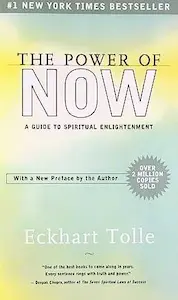The Power Of Now - Summary
Eckhart Tolle

Introduction
“The Power of Now” by Eckhart Tolle is a spiritual guidebook that emphasizes the importance of living in the present moment. The book has sold millions of copies worldwide and has been translated into over 30 languages. In this essay, we will provide a summary of the book, highlighting its key themes and concepts.
Background
Eckhart Tolle is a spiritual teacher and author who was born in Germany in 1948. He spent much of his early life searching for meaning and purpose, eventually experiencing a spiritual awakening at the age of 29. Tolle’s teachings are influenced by a variety of spiritual traditions, including Buddhism, Christianity, and Taoism.
Summary
“The Power of Now” is divided into ten chapters, each of which explores a different aspect of spiritual awakening. The book begins with an introduction that explains the author’s background and the purpose of the book. Tolle argues that most people are trapped in their own minds, which prevents them from experiencing true happiness and fulfillment.
In chapter one, Tolle introduces the concept of the “pain body,” which refers to the accumulation of emotional pain that people carry with them throughout their lives. He argues that the pain body is responsible for much of the suffering in the world and that it can be transcended through mindfulness and presence.
Chapter two explores the nature of the ego and how it creates a false sense of identity. Tolle argues that the ego is responsible for much of the conflict and suffering in the world and that it can be transcended through self-awareness and detachment.
Chapter three focuses on the importance of living in the present moment. Tolle argues that most people are trapped in their own minds, which prevents them from experiencing true happiness and fulfillment. He suggests that the key to living in the present moment is to cultivate a sense of awareness and mindfulness.
Chapter four explores the concept of “watching the thinker,” which refers to the practice of observing one’s own thoughts without judgment or attachment. Tolle argues that this practice can help people to break free from the grip of the ego and the pain body.
Chapter five focuses on the importance of acceptance and surrender. Tolle argues that resistance to the present moment is the root of all suffering and that true happiness and fulfillment can only be found through acceptance and surrender.
Chapter six explores the nature of relationships and how they can be transformed through spiritual awakening. Tolle argues that most relationships are based on egoic needs and desires, which leads to conflict and suffering. He suggests that true intimacy and connection can only be found through presence and awareness.
Chapter seven focuses on the importance of transcendence and the realization of one’s true nature. Tolle argues that true spiritual awakening involves a radical shift in consciousness, in which one transcends the limitations of the ego and realizes their true nature as pure consciousness.
Chapter eight explores the nature of death and how it can be transformed through spiritual awakening. Tolle argues that death is not an end but a transition to a higher state of consciousness.
Chapter nine focuses on the importance of living in harmony with the natural world. Tolle argues that human beings have become disconnected from nature, which has led to environmental destruction and the degradation of the planet. He suggests that true spiritual awakening involves a reconnection with nature and a recognition of our interconnectedness with all living beings.
Chapter ten concludes the book by summarizing its key themes and offering practical advice for living in the present moment.
Conclusion
In conclusion, “The Power of Now” is a spiritual guidebook that offers practical advice for living in the present moment and transcending the limitations of the ego and the pain body. The book has sold millions of copies worldwide and has been translated into over 30 languages. Its key themes include mindfulness, self-awareness, acceptance, surrender, and transcendence. By cultivating these qualities, readers can experience true happiness and fulfillment and live in harmony with the natural world.